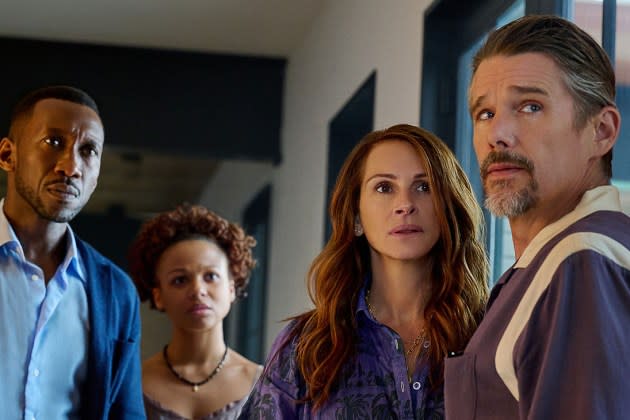‘Leave the World Behind’ Review: Julia Roberts and Mahershala Ali in Sam Esmail’s Not Quite Satisfying Dystopian Vision
- Oops!Something went wrong.Please try again later.

Anyone who still needs convincing that we live in a fractured world may be startled by the futuristic nightmare drama Leave the World Behind, which had its world premiere at AFI Fest. Others might find something a bit stale in its portrait of racial suspicion and environmental catastrophe. Fine performances help to bolster a problematic picture written and directed by Sam Esmail, adapted from Rumaan Alam’s best-selling novel. The film will take its bow via Netflix in December, the streamer’s second release this year (after Rustin) that counts Barack and Michelle Obama among its executive producers.
The story starts with a New York family (Julia Roberts, Ethan Hawke and, as their teenage children, Farrah Mackenzie and Charlie Evans) leaving the city for a vacation in a Long Island rental home that advertised with the line “Leave the world behind.” The house and the grounds are indeed enticing, and the nearby beach seems like just the tonic that the stressed family needs. But matters quickly turn ominous when the young daughter (Mackenzie), who seems to be the most perceptive of the four of them, notices a giant oil tanker that seems to be moving a little too close to the swimmers and sunbathers.
More from The Hollywood Reporter
'Leave the World Behind' Trailer Stars Julia Roberts in Obamas-Produced Netflix Thriller
Julia Roberts Confronts the Apocalypse in 'Leave the World Behind' Trailer
Esmail, probably best known for writing and directing the TV series Mr. Robot, and who worked with Roberts on Amazon’s Homecoming, has studied a number of earlier movies. The scene on the beach serves up a variation on Jaws, with the tanker substituting for the shark. The picture also echoes Get Out, with its nightmarish vision of conflict between the races. The family is surprised in the evening by a knock at the door. Seeing a Black man and his adult daughter (Mahershala Ali and Myha’la) outside, Roberts’ Amanda barely tries to conceal her suspicion. The interlopers inform the white couple that they own the vacation house and fled their New York apartment because of a blackout in the city. Power is still working in the country, but television and cellphone service have been disrupted. Gradually, more nightmarish events unfold.
Hawke’s Clay initially seems more open-minded than his wife, but he reveals his prejudice when, on a drive into town, he’s approached by a frightened Latina who begs for his help and he responds by locking his car doors and speeding away.
Late in the film, Kevin Bacon appears as some kind of survivalist with a huge American flag in front of his house and guns at the ready. He blames the “Koreans or Chinese” for threats to the American way of life. These political themes are rendered with a heavy hand by the filmmakers and carry few surprises.
As a nightmarish suspense drama about everyday life disintegrating, Esmail’s movie is sometimes effective, even while it echoes earlier films like The Road and David Koepp’s underrated 1996 thriller, The Trigger Effect. Esmail uses encroaching animals — a sinister herd of deer, a flock of flamingoes — with skill. A scene involving a crashing phalanx of empty Teslas is striking, and there’s a creepy scene in which teenage son Archie (Evans) finds his teeth falling out.
Performances are strong. Roberts has on occasion played unsympathetic characters, though these have been rare over the course of her long career. Here she is basically playing a Karen, a privileged white woman who makes little attempt to hide her mistrust and contempt for people who seem to be intruders in her privileged world. Gradually she does begin to see Ali’s homeowner as a three-dimensional character, and his performance is always riveting. Myha’la has a sassy, no-nonsense presence that also enriches the movie.
Technically the feature is extremely well crafted, with striking widescreen cinematography by Tod Campbell and expert production design — a mixture of elegance and decay — by Anastasia White. However, the overbearing score by Mac Quayle, who may be best known for his work on American Horror Story, too often crushes any subtlety that might have existed in the script. You come away depressed but not entirely convinced by this film’s dire warnings about the disintegration of a divided America.
Best of The Hollywood Reporter
Martin Scorsese’s 10 Best Movies Ranked, Including 'Killers of the Flower Moon'
13 Times Hollywood Predicted the Scary (or Not So Scary) Future of AI

